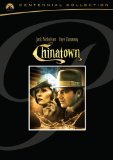| Reviews & Columns |
|
Reviews DVD TV on DVD Blu-ray 4K UHD International DVDs In Theaters Reviews by Studio Video Games Features Collector Series DVDs Easter Egg Database Interviews DVD Talk Radio Feature Articles Columns Anime Talk DVD Savant Horror DVDs The M.O.D. Squad Art House HD Talk Silent DVD
|
DVD Talk Forum |
|
|
| Resources |
|
DVD Price Search Customer Service #'s RCE Info Links |
|
Columns
|
|
|
Chinatown - The Centennial Collection
Paramount // R // October 6, 2009
List Price: $16.99 [Buy now and save at Amazon]
The Film:
"Well, to tell you the truth, I lied a little".
-- J.J. Gittes, Chinatown
When a film lover thinks of Roman Polanski's body of work, it usually involves two sharply-divided brackets of cinema: a catalogue of tense psychodrama in the vein of both Repulsion and The Tenant, and, of course, the noir-like mystery in Chinatown. Written with delicate precision by Robert Towne, this densely layered whodunit differs greatly from the rawness of Polanski's more cerebral pictures. Instead, the concentration falls on constructing a historically-minded story that's intelligent and complex -- yet still shockingly coherent. Considering its moody score, splendid period visuals, and iconic performances on top of Towne's unmatched script, Chinatown comes together under the typically unbridled director's eye into a superbly stylish masterwork of post-era noir.
Whether or not you decide to read up on the California Water wars of the early 1900s is neither here nor there, but you might find it a rewarding experience before diving into Towne's suspenseful fictionalization of the period. In our eyes, however, we follow J.J. Gittes (Jack Nicholson), an ex-Chinatown detective turned private investigator who mostly focuses on infidelity cases. One day, a Mrs. Mulwray comes into Gittes' office and solicits his services in order to watch her husband Hollis, the driving force behind California's water and power supply. Without hesitation, Gittes and his team get on the job. They discover that there's something else lying underneath the cheating husband mystery, a greed-fueled conspiracy that Gittes begins to unspool as he probes deeper.
Nicholson makes J.J. Gittes come alive in the central role. Fresh off his Oscar-nominated performance in The Last Detail, he steers away from the brashness of ole' "Bad Ass Buddusky" and dives into a more suave, smug demeanor befitting a detective of the time. As he schmoozes from place to place to learn more about Mawlray, it's impossible not to be drawn into his sly demeanor and indulge in every moment of it. Though he expresses the somewhat false sliminess of one in his profession, we identify with the moments where he exposes reality in his character -- especially when he clearly starts to let a few mistakes slip through the cracks. It's important for us to identify with Gittes because we're watching this story unfold somewhat through his eyes, unlike narration-heavy '40s noirs that reveal every internal detail.
It's only once we discover that the Mulwray infidelity is nothing more than the cream scooped off the top layer of corruption -- and that the woman who came to visit Mr. Gittes wasn't actually Mrs. Mulwray -- that Chinatown starts to exhibit its meticulousness as a top-shelf murder mystery. We're blindly led into the lucrative world of land ownership and the power of controlling water in a city, with the real Mrs. Evelyn Mulwray (Faye Dunaway) guiding Gittes' into it with uncertainty weighing on his, and our, shoulders. Faye Dunaway is stellar as Evelyn, especially as Chinatown progresses towards its revelatory conclusion. Eventually, we're introduced to co-water-tycoon Noah Cross, played with gusto by famed director John Huston of The Maltese Falcon, who assures us that his connection to Evelyn, wife to one tycoon and daughter to another, runs far deeper than just a struggle over land and money. And we're more than intrigued to peel the layers back in discovery of what's underneath.
Tonally, there really isn't a more perfectly-pitched film than Chinatown. Though the twists and turns grow more and more complex in Robert Towne's script, leading us through pitch-black water sites and ripe orange groves, none of it goes without purpose or simply to just get a rise out of us. It's ceiling-to-floor suspenseful, but sparks of other sensations pull off other varied levels of magnificence throughout. Though we're talking about a grim story about a grizzly cover-up murder fueled by profiteering, Towne never abandons a sense of humor with its stylish dialogue -- notably a clichéd "she's behind me, isn't she" moment that's used to potent effect. It's these rays of dry humor that work similarly to letting pressure out of an over-pumped tire; it never ceases to be intensely electric, but the rifts towards mild lightheartedness give it a grounded, human feel that allows us to connect with it amid the out-of-reach '30s era.
Part of Chinatown's seamlessness comes from sublimely crafted (Oscar-nominated) aesthetics. One of the first things you'll hear is a sleek trumpet solo from Jerry Goldsmith's original score, an arrangement pieced together at the 11th hour of the film's production. It holds a similar charged theme throughout the picture with these tunes, harking back to classic mannerisms of brooding noirs, while at other times grasping an Asian flare about its rhythm -- all while keeping its tempo vigorous with the ebbs and flows of the film's suspense. Unlike the multifaceted music, John Alonzo's cinematography only keeps '30s Los Angeles in mind as it gives us a near first-person account of J.J. Gittes' investigation. His eye, along with Polanski's attention to detail and Anthea Sylbert's sharp costume design, marvelously paints the semi-corrupt flood of lavishness from the period. It's also in the minuscule details, like the way our eyes are drawn to the hands of a broken pocket watch used to pinpoint the time a car drives away from a location, that make it such a rich visual experience.
As Chinatown begins to connect the dots late in the game, everything we've grown to appreciate about Roman Polanski's film whips into a whirling dervish of a conclusion that turns everything topsy-turvy -- then answers any and all questions we've pieced together about the mystery. Many of the great classic films leave a hint of suspicion about the events that stretch beyond the unavoidable finale, but Towne's story manages to wrap everything up in gratifying yet tragic fashion. But that melancholy dissatisfaction embodies the essence of true noirs, which certainly befits this sublime detective story. We're left wanting nothing else from Gittes' investigation and thankful to not be wrapped up in all that mess, yet completely mesmerized by the structured labyrinth of greed and villainy underneath Polanski's fingertips. Chinatown's a phenomenal departure for the typically mind-jarring director, as well as the overshadowing benchmark of the neo-noir genre that's still an ageless influence to this day.
The DVD:
Paramount continues their line of two-disc Centennial Collection packages with Chinatown, but it's missing a little something. Unlike the other DVDs in the collection, this one comes without the nice, somewhat thick cardboard slipcover that came with Sunset Boulevard, To Catch a Thief, and others. Everything else remains the same, from the gold-coated discs to the inner Booklet featuring mini-essays from an assortment of writers and a nice collage of photographs.
Video and Audio:
Chinatown fans will find this presentation of the film extremely familiar, as the 2.35:1 anamorphic image and Dolby Surround/Mono sound options come across as almost identical to that of the 2007 Special Collector's Edition DVD. It's so similar that full screenshot comparisons -- like the ones done on my previous reviews of Centennial Collection packages -- would be a moot point, if only to showcase a marginal boost in sharpness due to the fact that the film doesn't have to share space with the special features.
That's certainly not a bad thing, as the remastered image looks outstanding. Minor details like the broken glass on the pocket watch and the veil against Evelyn's face outside of the police precinct look crisp, while color saturation and contrast exhibit rather stunning levels of clarity. Plenty of colors leap out impressively from this rendering of John Alonzo cinematography, like the sumptuous red colors in the maroon and brown restaurant where Evelyn and J.J. Gittes meet and the fluctuating hues in the multi-colored landscapes. What's really striking are skin tones and coloring in both industrial and scenic backdrops, which easily boast concentration beyond the film's years. A few scattered blips can be seen here and there, some aliasing crops up in densely textured areas (like clothing) and some darker scenes showcase a bit more additional grain than you'd probably like, but Chinatown really couldn't look too much better in standard-definition.
Our audio options will also "sound" quite familiar as well, as the uninteresting yet supportable and separated 5.1 Surround and the solid Restored Mono tracks are both made available again. Paramount's DVD defaults to Dolby 5.1 track, which exhibits a lower volume yet delicate handling of sound elements trailing to separate points on the stage, while the Mono track exhibits more of a robust and natural keel that I appreciated. In both, dialogue is clear and audible, with only a few instances of verbal smothering occurring to rough degrees. Jerry Goldsmith's splendid score sounds excellent, with throaty trumpets and elegant waves of percussion instruments fluttering gracefully. Some sound effects aren't as crisp as we'd probably like, but thuds from hand-to-hand combat and the rushing of water had moments of exceptional clarity. French, Spanish, and Portuguese Mono tracks are available, along with optional English, French, Spanish, and Portuguese subtitles.
Special Features:
Commentary with Screenwriter Robert Towne and David Fincher:
This commentary played out in about the fashion you'd likely assume, with Fincher concentrating more on the film-making cues and Towne following through with the textual aspects. Fincher takes the lead in the track and sort of serves as moderator, prodding Towne with questions as it flows along. Fincher mostly concentrates on visual imagery, which there is plenty in Chinatown -- but some of the stuff he points out goes to a nice subtext level that some might not consider. Though it has a few gaps where they remain quiet and pay respect to the scenes (scenes we'd likely appreciate watching before hearing their commentary anyway), it's a relaxed and anecdote-littered track even if it repeats a bit of the history that's to be delved into deeper on the second disc.
On Disc 2:
Water and Power (1:17:46, 16x9):
Separated into three parts -- The Aqueduct, The Aftermath, and The River and Beyond -- historians, family, and Robert Towne delve into the history behind William Mulholland, the man whom the true struggle over water centered around in the 1910-20 time era. It offers a wealth of information about Mulholland himself, both with affirmation to his character being similar to those tycoons in the film as well as some dissuasion from the man's family. Ranchers talk about the nature of the land, while other family members reflect on records to paint an accurate picture of the villainy of the time. Though lengthy and very front-heavy with interest, it's certainly worth a watch -- especially the first portion.
Chinatown: An Appreciation (26:13, 16x9):
Several filmmakers get together to discuss Chinatown's impact on their film-making careers in this featurette, moving along in a subject-by-subject fashion with points from the film. Directors Steve Soderberg (Traffic) and Kimberly Price (Boys Don't Cry), cinematographer Roger Deacons (Shawshank Redemption), and composer James Newton Howard (The Dark Knight) all discuss elements ranging from cinematography and editing to Nicholson and Dunaway's stellar performances. They also heavily concentrate on Polanski's directorial precision, and how it affected their talents.
Chinatown: The Beginning and End (19:30, 4x3 from 2007):
This feature follows the initial conception and the cascade to come up with the conclusion to Chinatown. It talks about Polanski's tentative and stand-offish initial involvement with the film, Robert Towne writing a "detective story" about mundane things like water and power, as well as producer Robert Evans' offering of Great Gatsby to Towne -- and Towne desire not to mess up a literary classic. It also talks about the bleakness and procrastination in scripting the conclusion, as well as the need to create something cyclical by finishing the film in Chinatown.
Chinatown: The Filming (25:36, 4x3 from 2007):
As we start to soak into the actual construction of the film, we listen to Roman Polanski's interview time about minor details and the balking on the Godfather-like cinematography. They also talk about Polanski's small yet important acting role in the film, about the special knife they used for the scene, and Polanski's apprehension in cutting his hair for the scene. Robert Evans also discusses the necessity for irreverence for a film to be successful, as well as Dunaway being a "handful" on the set.
Chinatown: The Legacy (9:40, 4x3 from 2007):
Though the discussion happens early in the featurette, the most interesting line comes in Polanski mentioning that he was humdrum about making Chinatown -- and how that might have added a "cool" vibe on set. He sincerely didn't feel it was anything special, but the film's legacy would, of course, prove otherwise. It talks about Towne waiting for the "other shoe to drop" regarding the positive reviews, as well as Nicholson's intuition that Chinatown would garnish Academy award nominations. It also discusses its internally-developed cult-ish following based on the analyses on the film.
To wrap things up, we've got a Theatrical Trailer (3:21, 16x9 from 2007) available on the second disc -- which proves interesting from a musical standpoint, since the cues are fairly different than the ones in the actual film.
Final Thoughts:
It's only upon repeat viewing that Chinatown truly exposes the values that have transformed it into an enduring piece of work. Watching it once offers a prime detective mystery rich with sleek film-making and superb performances, yet something new opens up in the details and the ever-pleasing dialogue with every screening. That just goes to show how structured and compelling both Robert Towne's Oscar-winning script and Roman Polanski's direction can be in this film, as well as emphasizing the purely satisfying essence that the tightly-woven suspense thrusts before our eyes. Some classics might receive higher praise than they deserve, but Chinatown's not one of 'em -- as it is, in these eyes, a flawless film that'll hold its longevity for many, many years beyond.
Paramount's Centennial Collection package, something of a 35th anniversary of sorts, carries over the same style of aural and visual quality from the stellar 2007 DVD with a few strong extras added on, including a great commentary and a cluster of informative new documentary-style features. Certainly a Highly Recommended package, both for those who already own Chinatown or those who don't -- which, if you don't, consider this package a must-purchase, especially for the price.
Thomas Spurlin, Staff Reviewer -- DVDTalk Reviews | Personal Blog/Site
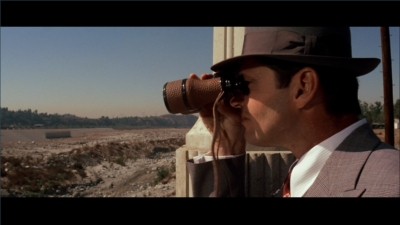 |
-- J.J. Gittes, Chinatown
When a film lover thinks of Roman Polanski's body of work, it usually involves two sharply-divided brackets of cinema: a catalogue of tense psychodrama in the vein of both Repulsion and The Tenant, and, of course, the noir-like mystery in Chinatown. Written with delicate precision by Robert Towne, this densely layered whodunit differs greatly from the rawness of Polanski's more cerebral pictures. Instead, the concentration falls on constructing a historically-minded story that's intelligent and complex -- yet still shockingly coherent. Considering its moody score, splendid period visuals, and iconic performances on top of Towne's unmatched script, Chinatown comes together under the typically unbridled director's eye into a superbly stylish masterwork of post-era noir.
Whether or not you decide to read up on the California Water wars of the early 1900s is neither here nor there, but you might find it a rewarding experience before diving into Towne's suspenseful fictionalization of the period. In our eyes, however, we follow J.J. Gittes (Jack Nicholson), an ex-Chinatown detective turned private investigator who mostly focuses on infidelity cases. One day, a Mrs. Mulwray comes into Gittes' office and solicits his services in order to watch her husband Hollis, the driving force behind California's water and power supply. Without hesitation, Gittes and his team get on the job. They discover that there's something else lying underneath the cheating husband mystery, a greed-fueled conspiracy that Gittes begins to unspool as he probes deeper.
Nicholson makes J.J. Gittes come alive in the central role. Fresh off his Oscar-nominated performance in The Last Detail, he steers away from the brashness of ole' "Bad Ass Buddusky" and dives into a more suave, smug demeanor befitting a detective of the time. As he schmoozes from place to place to learn more about Mawlray, it's impossible not to be drawn into his sly demeanor and indulge in every moment of it. Though he expresses the somewhat false sliminess of one in his profession, we identify with the moments where he exposes reality in his character -- especially when he clearly starts to let a few mistakes slip through the cracks. It's important for us to identify with Gittes because we're watching this story unfold somewhat through his eyes, unlike narration-heavy '40s noirs that reveal every internal detail.
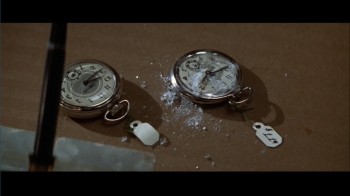 | 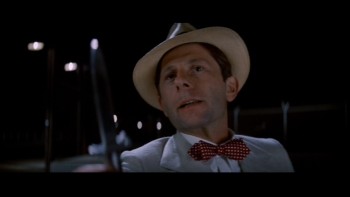 |
It's only once we discover that the Mulwray infidelity is nothing more than the cream scooped off the top layer of corruption -- and that the woman who came to visit Mr. Gittes wasn't actually Mrs. Mulwray -- that Chinatown starts to exhibit its meticulousness as a top-shelf murder mystery. We're blindly led into the lucrative world of land ownership and the power of controlling water in a city, with the real Mrs. Evelyn Mulwray (Faye Dunaway) guiding Gittes' into it with uncertainty weighing on his, and our, shoulders. Faye Dunaway is stellar as Evelyn, especially as Chinatown progresses towards its revelatory conclusion. Eventually, we're introduced to co-water-tycoon Noah Cross, played with gusto by famed director John Huston of The Maltese Falcon, who assures us that his connection to Evelyn, wife to one tycoon and daughter to another, runs far deeper than just a struggle over land and money. And we're more than intrigued to peel the layers back in discovery of what's underneath.
Tonally, there really isn't a more perfectly-pitched film than Chinatown. Though the twists and turns grow more and more complex in Robert Towne's script, leading us through pitch-black water sites and ripe orange groves, none of it goes without purpose or simply to just get a rise out of us. It's ceiling-to-floor suspenseful, but sparks of other sensations pull off other varied levels of magnificence throughout. Though we're talking about a grim story about a grizzly cover-up murder fueled by profiteering, Towne never abandons a sense of humor with its stylish dialogue -- notably a clichéd "she's behind me, isn't she" moment that's used to potent effect. It's these rays of dry humor that work similarly to letting pressure out of an over-pumped tire; it never ceases to be intensely electric, but the rifts towards mild lightheartedness give it a grounded, human feel that allows us to connect with it amid the out-of-reach '30s era.
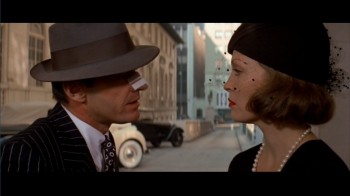 | 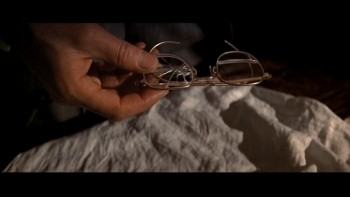 |
Part of Chinatown's seamlessness comes from sublimely crafted (Oscar-nominated) aesthetics. One of the first things you'll hear is a sleek trumpet solo from Jerry Goldsmith's original score, an arrangement pieced together at the 11th hour of the film's production. It holds a similar charged theme throughout the picture with these tunes, harking back to classic mannerisms of brooding noirs, while at other times grasping an Asian flare about its rhythm -- all while keeping its tempo vigorous with the ebbs and flows of the film's suspense. Unlike the multifaceted music, John Alonzo's cinematography only keeps '30s Los Angeles in mind as it gives us a near first-person account of J.J. Gittes' investigation. His eye, along with Polanski's attention to detail and Anthea Sylbert's sharp costume design, marvelously paints the semi-corrupt flood of lavishness from the period. It's also in the minuscule details, like the way our eyes are drawn to the hands of a broken pocket watch used to pinpoint the time a car drives away from a location, that make it such a rich visual experience.
As Chinatown begins to connect the dots late in the game, everything we've grown to appreciate about Roman Polanski's film whips into a whirling dervish of a conclusion that turns everything topsy-turvy -- then answers any and all questions we've pieced together about the mystery. Many of the great classic films leave a hint of suspicion about the events that stretch beyond the unavoidable finale, but Towne's story manages to wrap everything up in gratifying yet tragic fashion. But that melancholy dissatisfaction embodies the essence of true noirs, which certainly befits this sublime detective story. We're left wanting nothing else from Gittes' investigation and thankful to not be wrapped up in all that mess, yet completely mesmerized by the structured labyrinth of greed and villainy underneath Polanski's fingertips. Chinatown's a phenomenal departure for the typically mind-jarring director, as well as the overshadowing benchmark of the neo-noir genre that's still an ageless influence to this day.
The DVD:
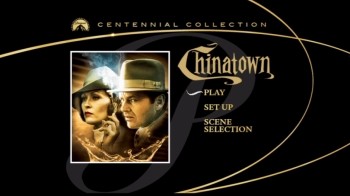 | 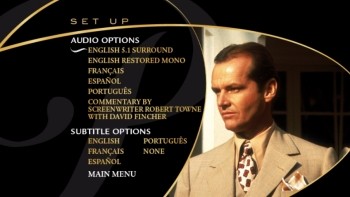 |
Paramount continues their line of two-disc Centennial Collection packages with Chinatown, but it's missing a little something. Unlike the other DVDs in the collection, this one comes without the nice, somewhat thick cardboard slipcover that came with Sunset Boulevard, To Catch a Thief, and others. Everything else remains the same, from the gold-coated discs to the inner Booklet featuring mini-essays from an assortment of writers and a nice collage of photographs.
Video and Audio:
Chinatown fans will find this presentation of the film extremely familiar, as the 2.35:1 anamorphic image and Dolby Surround/Mono sound options come across as almost identical to that of the 2007 Special Collector's Edition DVD. It's so similar that full screenshot comparisons -- like the ones done on my previous reviews of Centennial Collection packages -- would be a moot point, if only to showcase a marginal boost in sharpness due to the fact that the film doesn't have to share space with the special features.
That's certainly not a bad thing, as the remastered image looks outstanding. Minor details like the broken glass on the pocket watch and the veil against Evelyn's face outside of the police precinct look crisp, while color saturation and contrast exhibit rather stunning levels of clarity. Plenty of colors leap out impressively from this rendering of John Alonzo cinematography, like the sumptuous red colors in the maroon and brown restaurant where Evelyn and J.J. Gittes meet and the fluctuating hues in the multi-colored landscapes. What's really striking are skin tones and coloring in both industrial and scenic backdrops, which easily boast concentration beyond the film's years. A few scattered blips can be seen here and there, some aliasing crops up in densely textured areas (like clothing) and some darker scenes showcase a bit more additional grain than you'd probably like, but Chinatown really couldn't look too much better in standard-definition.
Our audio options will also "sound" quite familiar as well, as the uninteresting yet supportable and separated 5.1 Surround and the solid Restored Mono tracks are both made available again. Paramount's DVD defaults to Dolby 5.1 track, which exhibits a lower volume yet delicate handling of sound elements trailing to separate points on the stage, while the Mono track exhibits more of a robust and natural keel that I appreciated. In both, dialogue is clear and audible, with only a few instances of verbal smothering occurring to rough degrees. Jerry Goldsmith's splendid score sounds excellent, with throaty trumpets and elegant waves of percussion instruments fluttering gracefully. Some sound effects aren't as crisp as we'd probably like, but thuds from hand-to-hand combat and the rushing of water had moments of exceptional clarity. French, Spanish, and Portuguese Mono tracks are available, along with optional English, French, Spanish, and Portuguese subtitles.
Special Features:
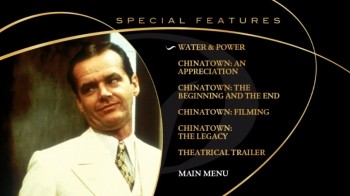 | 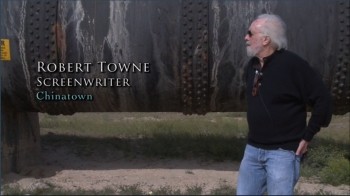 |
Commentary with Screenwriter Robert Towne and David Fincher:
This commentary played out in about the fashion you'd likely assume, with Fincher concentrating more on the film-making cues and Towne following through with the textual aspects. Fincher takes the lead in the track and sort of serves as moderator, prodding Towne with questions as it flows along. Fincher mostly concentrates on visual imagery, which there is plenty in Chinatown -- but some of the stuff he points out goes to a nice subtext level that some might not consider. Though it has a few gaps where they remain quiet and pay respect to the scenes (scenes we'd likely appreciate watching before hearing their commentary anyway), it's a relaxed and anecdote-littered track even if it repeats a bit of the history that's to be delved into deeper on the second disc.
On Disc 2:
Water and Power (1:17:46, 16x9):
Separated into three parts -- The Aqueduct, The Aftermath, and The River and Beyond -- historians, family, and Robert Towne delve into the history behind William Mulholland, the man whom the true struggle over water centered around in the 1910-20 time era. It offers a wealth of information about Mulholland himself, both with affirmation to his character being similar to those tycoons in the film as well as some dissuasion from the man's family. Ranchers talk about the nature of the land, while other family members reflect on records to paint an accurate picture of the villainy of the time. Though lengthy and very front-heavy with interest, it's certainly worth a watch -- especially the first portion.
Chinatown: An Appreciation (26:13, 16x9):
Several filmmakers get together to discuss Chinatown's impact on their film-making careers in this featurette, moving along in a subject-by-subject fashion with points from the film. Directors Steve Soderberg (Traffic) and Kimberly Price (Boys Don't Cry), cinematographer Roger Deacons (Shawshank Redemption), and composer James Newton Howard (The Dark Knight) all discuss elements ranging from cinematography and editing to Nicholson and Dunaway's stellar performances. They also heavily concentrate on Polanski's directorial precision, and how it affected their talents.
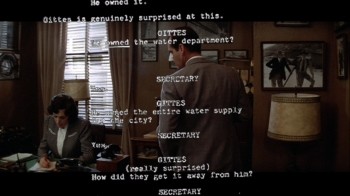 | 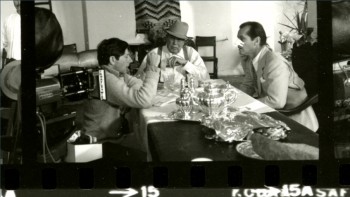 |
Chinatown: The Beginning and End (19:30, 4x3 from 2007):
This feature follows the initial conception and the cascade to come up with the conclusion to Chinatown. It talks about Polanski's tentative and stand-offish initial involvement with the film, Robert Towne writing a "detective story" about mundane things like water and power, as well as producer Robert Evans' offering of Great Gatsby to Towne -- and Towne desire not to mess up a literary classic. It also talks about the bleakness and procrastination in scripting the conclusion, as well as the need to create something cyclical by finishing the film in Chinatown.
Chinatown: The Filming (25:36, 4x3 from 2007):
As we start to soak into the actual construction of the film, we listen to Roman Polanski's interview time about minor details and the balking on the Godfather-like cinematography. They also talk about Polanski's small yet important acting role in the film, about the special knife they used for the scene, and Polanski's apprehension in cutting his hair for the scene. Robert Evans also discusses the necessity for irreverence for a film to be successful, as well as Dunaway being a "handful" on the set.
Chinatown: The Legacy (9:40, 4x3 from 2007):
Though the discussion happens early in the featurette, the most interesting line comes in Polanski mentioning that he was humdrum about making Chinatown -- and how that might have added a "cool" vibe on set. He sincerely didn't feel it was anything special, but the film's legacy would, of course, prove otherwise. It talks about Towne waiting for the "other shoe to drop" regarding the positive reviews, as well as Nicholson's intuition that Chinatown would garnish Academy award nominations. It also discusses its internally-developed cult-ish following based on the analyses on the film.
To wrap things up, we've got a Theatrical Trailer (3:21, 16x9 from 2007) available on the second disc -- which proves interesting from a musical standpoint, since the cues are fairly different than the ones in the actual film.
Final Thoughts:
It's only upon repeat viewing that Chinatown truly exposes the values that have transformed it into an enduring piece of work. Watching it once offers a prime detective mystery rich with sleek film-making and superb performances, yet something new opens up in the details and the ever-pleasing dialogue with every screening. That just goes to show how structured and compelling both Robert Towne's Oscar-winning script and Roman Polanski's direction can be in this film, as well as emphasizing the purely satisfying essence that the tightly-woven suspense thrusts before our eyes. Some classics might receive higher praise than they deserve, but Chinatown's not one of 'em -- as it is, in these eyes, a flawless film that'll hold its longevity for many, many years beyond.
Paramount's Centennial Collection package, something of a 35th anniversary of sorts, carries over the same style of aural and visual quality from the stellar 2007 DVD with a few strong extras added on, including a great commentary and a cluster of informative new documentary-style features. Certainly a Highly Recommended package, both for those who already own Chinatown or those who don't -- which, if you don't, consider this package a must-purchase, especially for the price.
|
| Popular Reviews |
| Sponsored Links |
|
|
| Sponsored Links |
|
|
| Release List | Reviews | Shop | Newsletter | Forum | DVD Giveaways | Blu-Ray | Advertise |
|
Copyright 2024 DVDTalk.com All Rights Reserved. Legal Info, Privacy Policy, Terms of Use,
Manage Preferences,
Your Privacy Choices | |||||||









